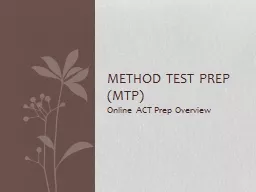PPT-SUU Presents: ACT Prep
Author : sherrill-nordquist | Published Date : 2019-11-20
SUU Presents ACT Prep The ACT The ACT is a national college admission test accepted by colleges and universities across the United States Best ACT Advice The ACT
Presentation Embed Code
Download Presentation
Download Presentation The PPT/PDF document "SUU Presents: ACT Prep" is the property of its rightful owner. Permission is granted to download and print the materials on this website for personal, non-commercial use only, and to display it on your personal computer provided you do not modify the materials and that you retain all copyright notices contained in the materials. By downloading content from our website, you accept the terms of this agreement.
SUU Presents: ACT Prep: Transcript
Download Rules Of Document
"SUU Presents: ACT Prep"The content belongs to its owner. You may download and print it for personal use, without modification, and keep all copyright notices. By downloading, you agree to these terms.
Related Documents












![[DOWNLOAD] - The Official ACT Prep Pack with 6 Full Practice Tests (4 in Official ACT](https://thumbs.docslides.com/902638/download-the-official-act-prep-pack-with-6-full-practice-tests-4-in-official-act-prep-guide-2-online.jpg)
![[DOWNLOAD] - The Official ACT Prep Pack with 6 Full Practice Tests (4 in Official ACT](https://thumbs.docslides.com/905968/download-the-official-act-prep-pack-with-6-full-practice-tests-4-in-official-act-prep-guide-2-online-61c04322de681.jpg)
